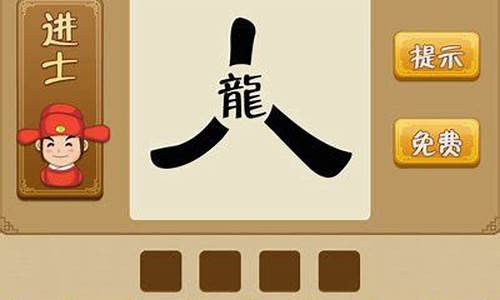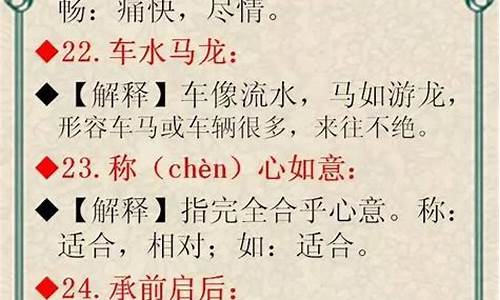您现在的位置是: 首页 > 成语接龙大全 成语接龙大全
用英语讲中国成语_用英语讲中国成语故事
ysladmin 2024-05-11 人已围观
简介用英语讲中国成语_用英语讲中国成语故事 接下来,我将为大家解答有关用英语讲中国成语的问题,希望我的回答对大家有所帮助。现在,我们就开始探讨一下用英语讲中国成语的话题吧。1.用英语简单写一个中国成语故事2.英语版中国
接下来,我将为大家解答有关用英语讲中国成语的问题,希望我的回答对大家有所帮助。现在,我们就开始探讨一下用英语讲中国成语的话题吧。
1.用英语简单写一个中国成语故事
2.英语版中国成语故事带翻译,短一点
3.英语版中国成语故事
4.用英语介绍成语文化

用英语简单写一个中国成语故事
英语成语故事-井底之蛙
The Frog in the Shallow Well (Jing Di Zhi Wa)
Have you not heard of the frog that lived in a shallow well? It said to a turtle that lived in the East Sea, "I am so happy! When I go out, I jump about on the railing beside the mouth of the well. When I come home, I rest in the holes on the broken wall of the well. If I jump into the water, it comes up to my armpits and holds up my cheeks. If I walk in the mud, it covers up my feet. I look around at the wriggly worms, crabs and tadpoles, and none of them can compare with me. Moreover, I am lord of this trough of water and I stand up tall in this shallow well. My happiness is full. My dear sir, why don't you come often and look around my place?"
Before the turtle from the East Sea could get its left foot in the well, its right knee got stuck. It hesitated and retreated. The turtle told the frog about the East Sea.
"Even a distance of a thousand li cannot give you an idea of the sea's width; even a height of a thousand ren cannot give you an idea of its depth. In the time of King Yu of the Xia dynasty, there were floods nine years out of ten, but the waters in the sea did not increase. ln the time of King Tang of the Shang dynasty there were droughts seven years out of eight, but the waters in the sea did not decrease. The sea does not change along with the passage of time and its level does not rise or fall according to the amount of rain that falls. The greatest happiness is to live in the East Sea."
After listening to these words, the frog of the shallow well was shocked into realization of his own insignificance and became very ill at ease.
=============================
英语故事:惊弓之鸟
A Bird Startled by the Mere Twang of a Bow-String
This set phrase figuratively denotes those who have suffered disasters and so have a lingering fear when anything happen.
During the War Period ,in the Wèi State there lived a famous archer named Gēng léi.
One day,Gēng léi and the King of Wei standing on a high terrace saw some birds flying past.
At this Gēng léi said to the King:"I'll shoot a flying bird down for YourMajesty by drawing a bow with no arrow."
The King asked,"Is it possible that one's archery can attain such a level?"
A little later,a wild goose was flying from the east.
Gēng léi just drew his bow but didn't shoot an arrow.
As expected,the wild goose fell to the ground with the twang.
The King asked in surprise,"How can your archery reach such a high level?"
Gēng léi replied ,"This wild goose has been wounded."
The King got more surprised,asking,"How do you know it,sir?"
Gēng léi esplained,"This wild goose flew slowly and cried sadly.Its flying slowly suggested that it was still aching with the old wound; its crying sadly suggested that it had strayed long from its flock.When it heard the twang the wild goose had to flutter hard to fly high for its life.So it is evitably fell down with its old wound burst."
=============================
刻舟求剑
Making His Mark (Ke Zhou Qiu Jian)
A man from the state of Chu was crossing a river. In the boat, his sword fell into the water. Immediately he made a mark on the boat.
"This is where my sword fell off," he said.
When the boat stopped moving, he went into the water to look for his sword at the place where he had marked the boat.
The boat had moved but the sword had not. Is this not a very foolish way to look for a sword?
英语版中国成语故事带翻译,短一点
导读人在1到3岁的时候,特别容易接受语言教育,家长们都有意为之的进行少儿英语启蒙,那么用常用的成语来启蒙孩子,无疑是一种很不错的方式,那么今天小编就来和大家一起学习一下常用的成语用英语怎么说,仅供参考。名山大川famous mountains and great rivers
名胜古迹scenic spots and historical sites
湖光山色landscape of lakes and hills
青山绿水green hills and clear waters
奇松怪石strangely-shaped pines and grotesque rock formations
平等互利equality and mutual benefit
扬长避短play up strengths and avoid weaknesses
反腐倡廉fight corruption and build a clean government
简政放权streamline administration and institute decentralization
集思广益draw on collective wisdom and absorb all useful ideas
国泰民安the country flourish and the people live in peace and harmony
政通人和the government functions well and people cooperate well
国计民生national welfare and the people’s livelihood
辞旧迎新bid farewell to the old year and usher in the new
徇私舞弊bend the law for personal gain and engage in fraud
流连忘返linger on with no thought of leaving for home
国际局势复杂多变the complex and volatile international situation
开拓进取blaze new trails and forge ahead
求同存异seek common ground while shelving differences
广袤无垠的中华大地the boundless expanse of the Chinese territory
高瞻远瞩的决策a visionary/far-sighted decision
贯彻落实重大决策carry out/ implement a series of major policy decisions
层峦叠嶂peaks rising one after another
优胜劣汰survival of the fittest
延年益寿prolong one’s life
灵丹妙药panacea / miraculous cure
长治久安a long period of stability
求真务实pragmatic
审时度势size up the trend of events
招商引资attract investment
誉满全球举世闻名world-renowned
功在当代,利在千秋in the interest of the current and future generations
继往开来,承前启后(continue the past and open up the future ) break new ground for the
future
路遥知马力,日久见人心Time will tell.
吃的苦中苦,方知甜中甜no sweet without sweat
车到山前必有路,船到桥头自然直in the end things mend /there’s always a way out
急功近利eager for instant success and quick profits
大黑扫黄crack down on gangland and pornography
德高望重of high ability and integrity
互利互补mutually complementary and beneficial
互谅互让mutual understanding and accommodation
遵纪守法observe the relevant code of conduct and the law
以上就是小编今天给大家整理发布的关于“少儿英语启蒙:常用的成语用英语怎么说?”的相关内容,希望对各位考生有所帮助。随着社会的发展,英语变得越来越重要,那么如何给孩子做英语启蒙就显得很重要了,科学有效的方法可以取得事半功倍的效果哦!
英语版中国成语故事
塞翁失马Blessing or Bane
战国时期,靠近北部边城,住着一个老人,名叫塞翁。塞翁养了许多马,一天,他的马群中忽然有一匹走失了。邻居们听说这件事,跑来安慰,劝他不必太着急,年龄大了,多注意身体。塞翁见有人劝慰,笑了笑说:“丢了一匹马损失不大,没准会带来什么福气呢。”
邻居听了塞翁的话,心里觉得很好笑。马丢了,明明是件坏事,他却认为也许是好事,显然是自我安慰而已。过了几天,丢失的马不仅自动返回家,还带回一匹匈奴的骏马。 邻居听说了,对塞翁的预见非常佩服,向塞翁道贺说:“还是您有远见,马不仅没有丢,还带回一匹好马,真是福气呀。” 塞翁听了邻人的祝贺,反而一点高兴的样子都没有,忧虑地说:“白白得了一匹好马,不一定是什么福气,也许惹出什么麻烦来。” 邻居们以为他故作姿态纯属老年人的狡猾。心里明明高兴,有意不说出来。 塞翁有个独生子,非常喜欢骑马。他发现带回来的那匹马顾盼生姿,身长蹄大,嘶鸣嘹亮,膘悍神骏,一看就知道是匹好马。他每天都骑马出游,心中洋洋得意。 一天,他高兴得有些过火,打马飞奔,一个趔趄,从马背上跌下来,摔断了腿。邻居听说,纷纷来慰问。 塞翁说:“没什么,腿摔断了却保住性命,或许是福气呢。”邻居们觉得他又在胡言乱语。他们想不出,摔断腿会带来什么福气。 不久,匈奴兵大举入侵,青年人被应征入伍,塞翁的儿子因为摔断了腿,不能去当兵。入伍的青年都战死了,唯有塞翁的儿子保全了性命。Near China's northern borders lived a man well versed in the practices of Taoism. His horse, for no reason at all, got into the territory of the northern tribes. Everyone commiserated with him.
"Perhaps this will soon turn out to be a blessing," said his father.
After a few months, his animal came back, leading a fine horse from the north. Everyone congratulated him.
"Perhaps this will soon turn out to be a cause of misfortune," said his father.
Since he was well-off and kept good horses his son became fond of riding and eventually broke his thigh bone falling from a horse. Everyone commiserated with him.
"Perhaps this will soon turn out to be a blessing," said his father.
One year later, the northern tribes started a big invasion of the border regions. All able-bodied young men took up arms and fought against the invaders, and as a result, around the border nine out of ten men died. This man's son did not join in the fighting because he was crippled and so both the boy and his father survived.
用英语介绍成语文化
江郎才尽
Southern Dynasties of Jiang Yan, word Wen-tung, when he was young, became a Dingdingyouming writer, his poems and articles at the time received high acclaims. However, when he is getting older, he has not previously written an article good, but a lot of setbacks. His poems written in prosaic; and pick up a pen-yin grip for a long time, still can not write a word, the occasional inspiration came; poem written, but the textual Kuse, content, plain were completely useless. So some people to legend, once a boat parked in Chan Jiang Yan-Ling Monastery river and dream of a self-named Zhang Jingyang person; to his followers repay a silk, he would arrest a few feet from her, he is also silk. Thus, his article there will be no wonderful. It was also legend; once the rule of Jiang Yan in the booth sleeping too; dreamed that a person claiming to Guo Pu, walked over to his side, his claim to the pen, said to him: "Man Michie, I have a pen in your place has been a long time, and now should be able to give it to me the bar! "Jiang Yan heard, they dig out from his arms, he is also a five-color pen. Reportedly Since then, Jiang Yan on Evans exhausted and could not write the article in any good.
Jiang Yan's talent has not really run out, but he was an officer after the one hand, as the Chief busy, on the other hand also because of career proud of, without their own write, to sweat, they did not write the. Over time, the article will bring out less, lacking in talent. (Excerpt from "Practical Writing" 1995 No. 8 "I hope," Jiang "was not exactly")
南朝的江淹,字文通,他年轻的时候,就成为一个鼎鼎有名的文学家,他的诗和文章在当时获得极高的评价。 可是,当他年纪渐渐大了以后,他的文章不但没有以前写得好了,而且退步不少。他的诗写出来平淡无奇;而且提笔吟握好久,依旧写不出一个字来,偶尔灵感来了;诗写出来了,但文句枯涩,内容 平淡得一无可取。于是就有人传说,有一次江淹乘船停在禅灵寺的河边,梦见一 个自称叫张景阳的人;向他讨还一匹绸缎,他就从怀中拘出几尺绸缎还他。因此,他的文章以后便不精彩了。又有人传说;有一次江淹在冶亭中睡午觉;梦见一个自称郭璞 的人,走到他的身边,向他索笔,对他说:“文通兄,我有一支笔在你那儿已经很久了,现在应该可以还给我了吧!” 江淹听了,就顺手从怀里取出一支五色笔来还他。据说从此以后,江淹就文思枯竭,再也写不出什么好的文章了。
其实并不是江淹的才华已经用完了,而是他当官以后,一方面由于政务繁忙,另一方面也由于仕途得意,无需自己动笔,劳心费力,就不再动笔了。久而久之,文章自然会逐渐逊色,缺乏才气。(节选自《应用写作》1995年第8期《但愿“江郎”才不尽》)
Idiom culture is the crystallization of Chinese wisdom, is an important carrier of Chinese culture, idioms are the essence of Chinese, with a strong expression. Idioms contain valuable cultural wealth, from which we can appreciate the glory of Chinese ancient material civilization, understand the Chinese ancient education thought, traditional Chinese virtue and so on.
Idioms and production
"Sunrise, sunset, sinking and drink." The Yellow River, the Yangtze River has nurtured our fertile home, agricultural production is the basis of ancient China, agriculture has become the country's basic commitment to taxes. There are many idioms to the ancient ancestors of agricultural production and life were described. "The vast fields that crisscross footpaths between fields", continuously. "That meticulous farming intensive and meticulous farming". "Hangengreyun farming" cold, hot weeding. Describe the hardships of farming. "Pipe - Chen horse": "he's good, make the farmer Hangengreyun, to force." These idioms are reflected on the agriculture, is agricultural the consensus, feudal emperors have advocated "restraining" at the end, the agriculture as the country solid Bunning foundation and achievement of hegemony based.
Agricultural producers also gradually develop a soil cheerful life, living there, farming and sometimes. For example, "Gonggengledao" refers to the person farming, happy to keep the saints. "Three Kingdoms Weishu guanning biography": "[] but in Hu Zhao Luhun mountains, Gonggengledao, to amuse themselves by." "Volume one seven:" cautionary rhetoric "hidden in the fields of education, Gonggengledao, two."
And some of the idioms literally describe the agricultural life, and now often use their figurative meaning. For example, "Xitianduoniu" (morning glory let the cattle on the field, therefore, is to take the cattle. Metaphor heavy penalties), DDR (veterans return home farm, now refers to leave home), "Haste makes waste" and so on.
译文:成语文化是中华智慧的结晶,是中华文化的重要载体,成语又是汉语中的精华,具有极强的表现力。成语蕴含着宝贵的文化财富,从中我们可以体会到中国古代物质文明的辉煌,了解中国古代教育思想,传统中华美德等众多方面。
成语与生产
“日出而作,日落而息,凿井而饮。”黄河、长江哺育了我们肥沃的家园,农业生产是古代中国的基础,农业成为国家赋税的基本承担者。有许多成语对古代先民农业生产生活进行了描写。“田连阡陌”,谓田地广袤,接连不断。“精耕细作”谓精心细致的耕作。“寒耕热耘”寒冷时耕种,炎热时除草。形容农事艰辛。《管子·臣乘马》:“彼善为国者,使农夫寒耕热耘,力归于上。”这些成语都体现了重农、尚农的共识,历代封建帝王都提倡“重农抑末”,把农业看作是国固邦宁的根底,成就霸业的基础。
农业生产者也逐渐养成一种安土乐天的生活情趣,起居有定,耕作有时。例如,“躬耕乐道”是指亲自耕种,乐守圣贤之道。《三国志·魏书·管宁传》:“[胡]昭乃转居陆浑山中,躬耕乐道,以经籍自娱。”《警世恒言》卷一七:“隐于田里,躬耕乐道,教育二子。”
还有一些成语字面上描写农业生活,现在经常使用它们的比喻义。例如,“蹊田夺牛”(牵牛的让牛踩了田地,因此,被人把牛夺走。比喻惩罚过重),“解甲归田”(军人退伍回乡务农,现泛指离职回家),“拔苗助长”等等。
好了,今天关于“用英语讲中国成语”的话题就讲到这里了。希望大家能够对“用英语讲中国成语”有更深入的认识,并且从我的回答中得到一些帮助。
点击排行
随机内容
-

成语故事寓言故事历史故事神话故事的区别_成语故事,寓言故事,历史故事,神话故事的区别
-

看图猜成语200个图答案大全_看图猜成语200个图答案大全介绍
-

成语接龙答案大全图片_成语接龙答案大全图片下载
-

简单的成语故事_简单的成语故事50字左右
-

成语大全及解释6000个小学简单概括_成语大全及解释6000个小学简单概括一下
-

成语大全及解释6000个小学简单概括_成语大全及解释6000个小学简单概括一下
-

高考成语专题训练及答案解析精讲_高考成语专题训练及答案解析精讲版
-

qq成语接龙红包gei字怎么接_qq成语接龙红包给字怎么接
-

成语及成语注释_成语及成语注释大全
-

成语接龙答案大全图片_成语接龙答案大全图片下载